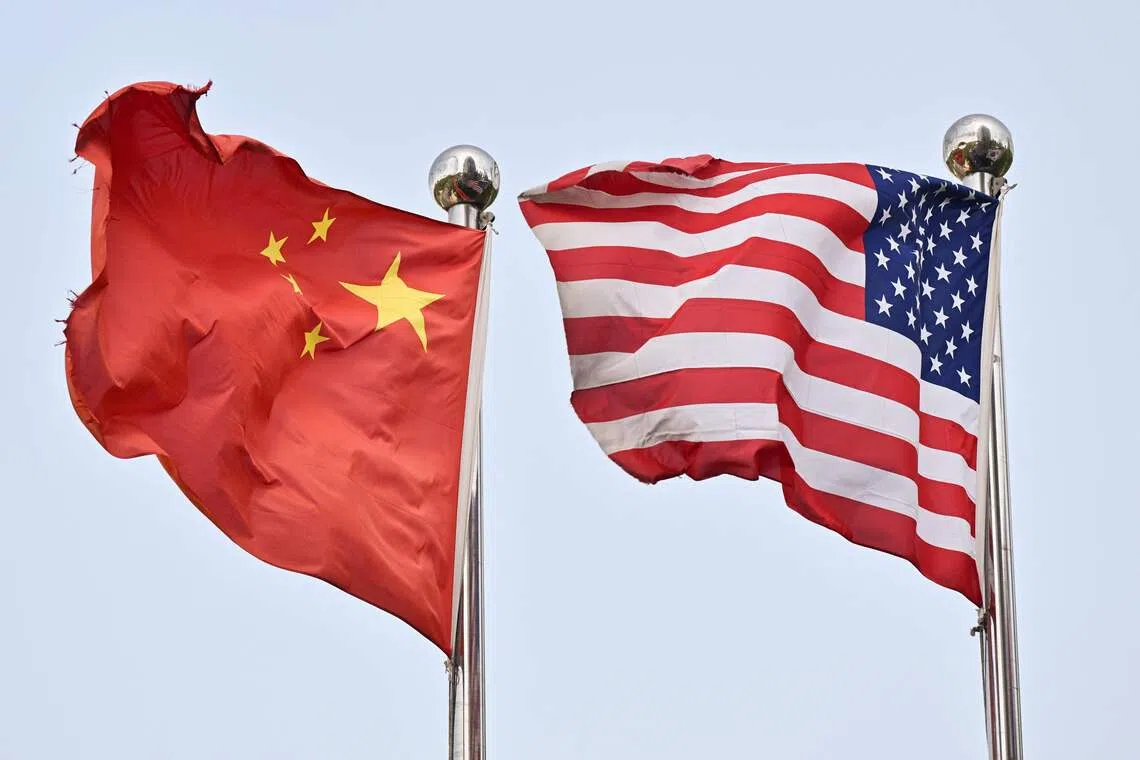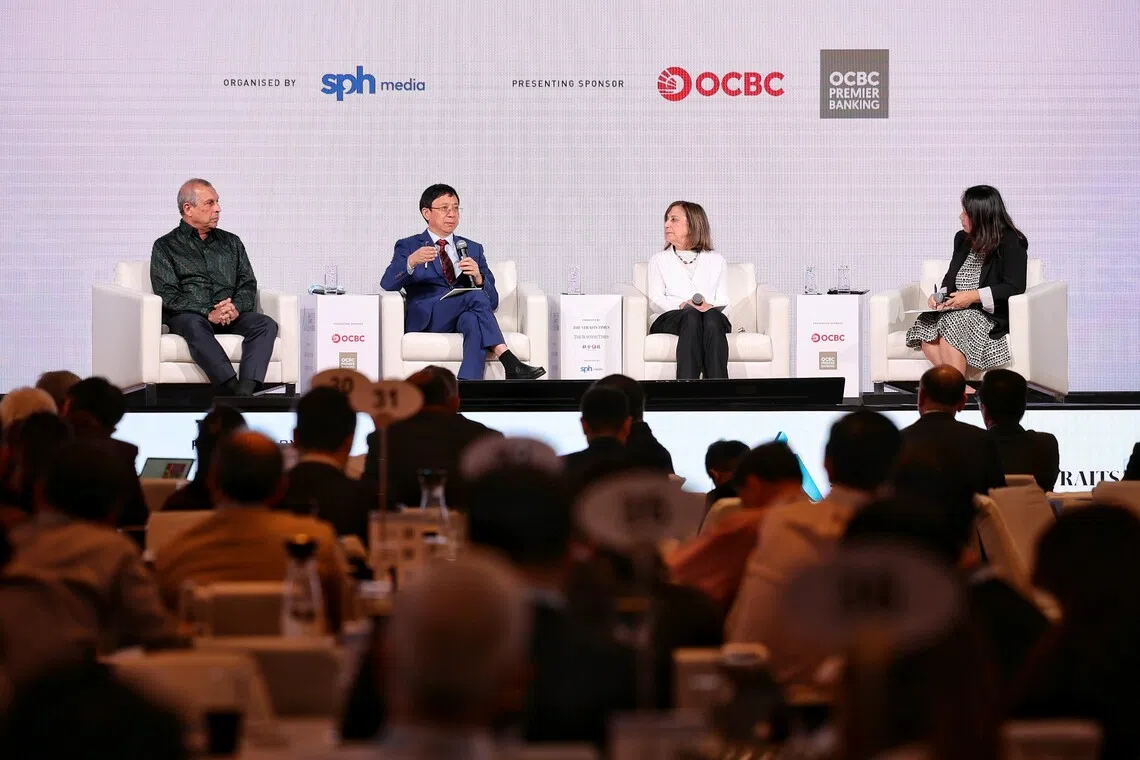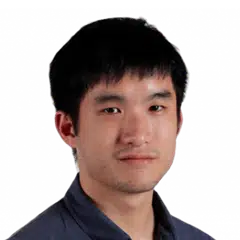Pragmatism may temper turbulent US-China relationship: Asia Future Summit panel
Sign up now: Get insights on Asia's fast-moving developments

While there is some optimism that the relationship between the US and China could stabilise, the experts said keeping communication channels open and avoiding conflict is key.
PHOTO: AFP
- US-China relations will likely remain tense for the next 5-10 years, said a panel of observers.
- Experts suggest potential for stabilisation if both sides keep channels of communications open, cooperate on issues like rare earth supply and foreign investments.
- There were differing views on whether US-China trade agreement will be reached at the Apec Summit in South Korea, where Trump and Xi are expected to meet face-to-face for the first time since 2019.
AI generated
SINGAPORE – The relationship between the US and China will remain rocky over the next five to 10 years, marked by continued tension and turbulence with modest gains possible in ongoing trade talks, observers said during a panel discussion on Oct 9 at the annual Asia Future Summit
While there is some optimism that the relationship between the two superpowers could stabilise, the experts said keeping communication channels open and avoiding conflict is key, with Taiwan a sticking point that could derail relations.
Mr Ashok Mirpuri, head of international policy and governance at Singapore investment company Temasek, was generally positive about the trajectory of US-China ties.
“Both sides understand the risks that a very significant conflict between them will be terrible for all of us,” said Mr Mirpuri, who was Singapore’s ambassador to the US from 2012 to 2023.
The Asia Future Summit held at The Ritz-Carlton, Millenia Singapore hotel is a thought leadership conference jointly presented by SPH Media flagship titles The Straits Times, Lianhe Zaobao and The Business Times, with OCBC as the presenting sponsor.
Dr Wu Xinbo, dean of the Institute of International Studies and director at the Centre for American Studies at Fudan University, believes the US will continue to do whatever it takes to try to contain and suppress China.
But as China continues to make progress in technology and grow its economy, the US may begin to see the limits of its China policy and rethink its approach, he said.
The US may also realise that it needs to cooperate with China on many issues, such as the supply of rare earth materials
A more realistic and pragmatic approach by the US towards China would help to stabilise ties, the academic added.
However, he also believes the US-China relationship will go through crises and conflicts, and called for Washington to work with Beijing to put in place mechanisms for crisis management, communication and confidence-building.
Asia Society Policy Institute senior vice-president Wendy Cutler, who is a former US deputy trade representative, said keeping the channels of communication open between the two powers was critical.
“When those channels have been closed, that is when the world gets the most nervous,” she added.
The panel discussion, titled “What’s Next for US-China and the World?”, was moderated by Lianhe Zaobao foreign editor Ng Hui Min.
The panellists expressed mixed views when asked about the likelihood of a substantive trade agreement being reached between the US and China at the upcoming Asia-Pacific Economic Cooperation (Apec) summit in South Korea.
US President Donald Trump had earlier said that he and Chinese President Xi Jinping would meet on the sidelines of the summit
Ms Cutler said she foresees a productive meeting, but called for modest expectations.
“I think we will see a series of isolated announcements, but not a real trade agreement,” she said, noting that some likely outcomes include finalising the sale of TikTok’s US operations and a further extension of a pause on three-digit tariffs.
In April, the US had slapped a blanket 145 per cent levy on Chinese goods
Both sides later reached a truce and pared their levies back, with the US tariffs now averaging 55 per cent
Said Ms Cutler: “I am very sceptical of the US embracing the Chinese request to somehow eliminate or reduce tariffs, particularly for Chinese companies investing in the US. Because if Washington were to do that, they would also have to eliminate those tariffs for US companies, as well as for suppliers from other countries as well.”
Still, she said some progress could be made regarding an increase in foreign direct investment from China into the US.

(From left) Mr Ashok Mirpuri, head of international policy and governance at Temasek; Dr Wu Xinbo, dean of the Institute of International Studies and director at the Centre for American Studies at Fudan University; and Ms Wendy Cutler, senior vice-president of Asia Society Policy Institute; at a dialogue moderated by Lianhe Zaobao foreign editor Ng Hui Min during the Asia Future Summit on Oct 9.
ST PHOTO: KEVIN LIM
Dr Wu was more confident about a concrete outcome from the planned Trump-Xi meeting in South Korea, expressing hope about the removal of a 20 per cent tariff by the US on Chinese goods that is related to allegations of fentanyl trafficking.
“Every time the two leaders are supposed to meet, they want to deliver something on the political agenda,” Dr Wu said, noting a positive shift in the mode of engagement recently between the two sides – from coercion to confrontation to talks.
He added: “If China and the US, the two largest world economies, can gradually reduce their friction, reduce confrontation, stabilise bilateral relations, and begin to approach economic relations in a more win-win, rather than zero-sum, turn, I think that is certainly a positive signal to the markets throughout the world.”
Calling for more military-to-military engagement, Mr Mirpuri warned that there are still significant elements of instability between the US and China.
One example is the issue of Taiwan, which poses “significant risk of miscalculation”, said the former diplomat.
The panel also addressed questions about the erosion of the rules-based global order, with Ms Cutler criticising China’s new Global Governance Initiative as “a lot of words, not a lot of details”.
Dr Wu, meanwhile, said China has stepped in to fill the gap left by a more inward-looking US, boosting its funding to the World Health Organisation after the US withdrew from it.
Pointing to the recent establishment of a partnership between Singapore and 13 other small and medium-sized states
“What is the new role of middle power? Where does Indonesia fit in this? Where does Turkey fit? Where does Brazil fit in? These are new adjustments that need to be made,” he added.




